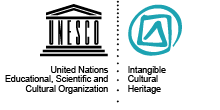Vous êtes ici : UNESCO » Culture » Intangible Heritage » Donors and partners » European Union (MedLiHer) » Overview of the project
Intangible Cultural Heritage
L'UNESCO et ses principaux secteurs : UNESCO — Education — Natural Sciences — Social and Human Sciences — Culture — Communication and Information — Media Services

